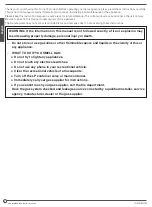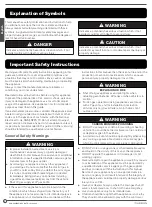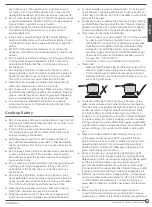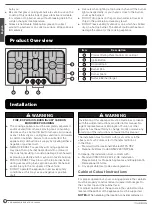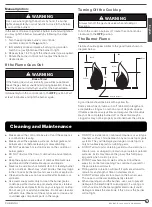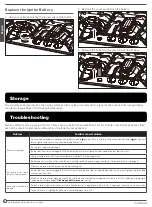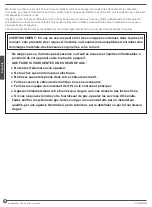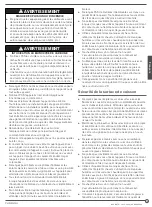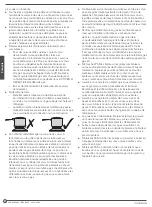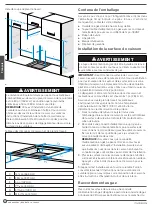
4
English
any other parts of the appliance. Do not allow anyone
to stand or sit on top of the appliance. Not only can this
damage the appliance, but personal injuries could result.
●
Do not store items of interest to children in cabinets above
or near the appliance. Children climbing on the appliance
to reach items could be seriously injured.
●
All control knobs must be turned off when not in use.
Fire and/or burning hazard may occur if a burner is
accidentally left on.
●
If any burner should extinguish (after initially lighting or
due to accidental blow-out), turn all burner knobs off and
wait five (5) minutes before again attempting to light the
burner.
●
DO NOT store flammable materials on, in, or near the
appliance. Any fumes can create an explosion and/or fire
hazard.
●
Do not wear loose fitting clothing or long-hanging sleeved
clothing while using the appliance. If they contact the
open flame of the burner, they could ignite and cause
severe burns.
●
Use only dry potholders to remove hot utensils. Using
damp potholders on hot surfaces could result in burns to
hands. Do not use a towel or bulky cloth for a pot holder.
The cloth could contact open flame and catch fire.
●
Never heat an unopened container. Pressure build-up
within the container can cause it to explode.
●
Do not use water on grease fires. Never pick-up a flaming
pan. Smother a flaming pan with a lid or flat pan. Flaming
grease outside the pan can be extinguished with baking
soda or a multipurpose dry chemical fire extinguisher.
●
This appliance is intended to be built-in to a cabinet
structure only and is not intended for attachment to the
building structure.
Cooktop Safety
●
Do not place pans onto glass surface. Raise cover into full
open position before operating burners. Let cooktop cool
before closing glass cover.
●
If the cooktop is near a window, proper precautions
should be taken to prevent curtains from blowing over
burners creating a fire hazard.
●
Keep the area around the cooktop clean and clear of
any combustible materials, gasoline or other flammable
vapors and liquids. Not doing so can cause an explosion
and/or fire.
●
Do not leave children alone or unsupervised in area where
cooktop is being used. The top burners, burner grates
and other areas near the burners become hot enough to
cause severe burns.
●
Do not wear loose fitting clothing or long-hanging sleeved
clothing while using the appliance. If they contact the
open flame of the burner, they could ignite and cause
severe burns.
●
Use only dry potholders to remove hot utensils. Using
damp potholders on hot surfaces could result in burns to
hands. Do not use a towel or bulky cloth for a pot holder.
The cloth could contact open flame and catch fire.
●
Never heat an unopened container. Pressure build-up
within the container can cause it to explode.
●
Keep the appliance clean. The build-up of grease and
food boil-over and/or spillage can create a fire hazard.
●
Turn pan handles inward or toward back of cooktop and
out of the way of people walking past cooktop and/or out
of the reach of children. Do not turn handles to where they
are over the burners.
●
Do not use water on grease fires. Never pick-up a flaming
pan. Smother a flaming pan with a lid or flat pan. Flaming
grease outside the pan can be extinguished with baking
soda or a multipurpose dry chemical fire extinguisher.
●
Never leave top burner(s) unattended.
−
For such reasons as down drafts that could be created
by opening and closing of cabinet doors or doors
within the RV or by positive or negative air pressures
affecting burners due to improper installation. (See
Installation section) The burner could extinguish
resulting in gas escaping into the RV. Remember, gas
flow to each burner is controlled manually, you must
turn gas flow “ON” and “OFF”.
−
A boil over could occur and the spill could ignite.
●
Flame size
−
Never extend the flame beyond the outer edge of the
utensil. A higher flame simply wastes heat and energy.
−
Correct flame size is determined by utensil size and
material, what you are cooking and whether or not you
are cooking with liquid.
●
To prevent damage to the cooktop, top burners, or top
grate, never operate a top burner without a pan in place.
The top burners, especially the high input burner, should
not be operated on high for an extended period of time.
The high setting should be used only to start the food
cooking or to bring liquids to a boil, then reduce the flame
to a lower setting to continue cooking. Use the low flame
setting to keep food warm. Remember, a gas range heats
quicker than an electric range, therefore, experiment with
various settings until you feel comfortable cooking with
gas.
●
Never use cookware which extends beyond one inch
of the grate (maximum pan size 10" diameter). Never
place cooking utensil on grate to where it rests over two
operating top burners. This will cause excessive heat
buildup, which could result in damage in damage to the
grate, top burner(s) and cooktop.
●
Verify sufficient gas supply before attempting to light
any top burner. Air in the gas supply line will significantly
delay burner ignition, and a burner may light unexpectedly
as the air in the line clears out and is replaced by LP
gas, this unexpected ignition may burn you. Air may be
introduced into the supply line when the vehicle gas bottle
is replaced, during servicing of other gas appliances, etc.
●
DO NOT touch top burners, burner grates, or other areas
near top burners during and after use. Do not let clothing
or other flammable materials to contact top burners or
areas near top burners until they have had sufficient time
to cool.
●
Make sure the utensils you use are large enough to
contain food and avoid boil overs and spillovers. Heavy
splattering or spillovers left on the cooktop can ignite and
REV DATE: 10.14.2022 | CCD-0005583


